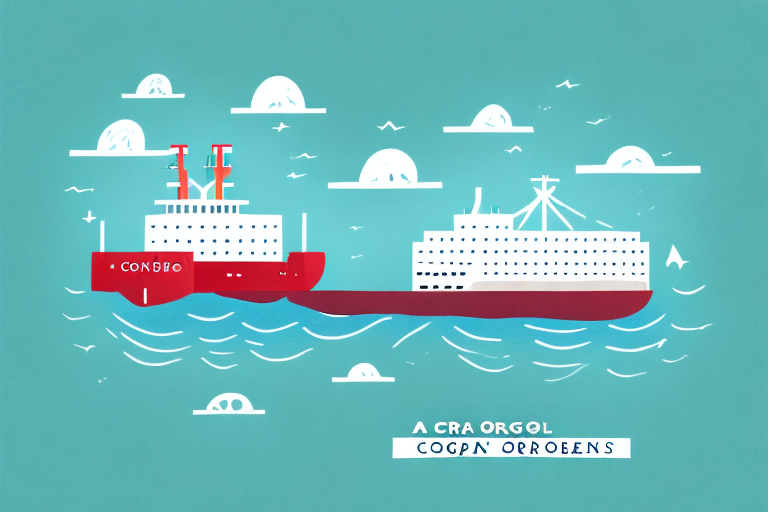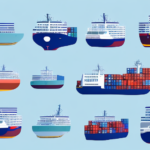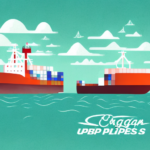Understanding the Benefits of UPS Ocean Freight LCL Shipping
In today's global market, shipping and logistics are crucial to the success of any business. A common challenge faced by many businesses is determining the most cost-effective and efficient method of shipping their goods internationally. UPS Ocean Freight LCL Shipping is becoming an increasingly popular choice due to its many benefits. In this article, we will explore what LCL shipping is, the advantages it offers over other shipping methods, the role of UPS in LCL shipping, factors to consider when choosing LCL shipping, and much more.
What is LCL Shipping and How Does It Work?
LCL shipping stands for Less than Container Load shipping. This method is used when a company's shipment does not fill an entire shipping container. Instead, the shipment is combined with other shipments headed to the same destination. The cost of the container is shared between all the businesses whose shipments are combined, making it a cost-effective shipping method.
The shipments are packed into the container and then unpacked at the destination port. Each shipment is then transported to its final destination. According to industry reports, LCL shipping can reduce shipping costs by up to 30% compared to Full Container Load (FCL) shipping.
One of the advantages of LCL shipping is that it allows small businesses to access international markets without having to worry about the high costs associated with full container loads. This is particularly beneficial for businesses that are just starting out and do not have the resources to fill an entire container with their products.
However, there are also some disadvantages to LCL shipping. Since the container is shared with other businesses, there is a risk of damage or loss of goods during transit. Additionally, the process of consolidating and deconsolidating shipments can add time to the overall shipping process, which may not be ideal for businesses that require fast delivery times.
Advantages of LCL Shipping Over FCL Shipping
LCL shipping has several significant advantages over Full Container Load (FCL) shipping:
- Cost-Effectiveness: FCL shipping requires a company to fill an entire shipping container with their goods, making it more expensive than LCL shipping, especially for small businesses.
- Flexibility: Companies can ship smaller quantities of goods more frequently, allowing them to respond quickly to changes in customer demand.
- Better Inventory Management: Sending smaller quantities of goods to different destinations helps in managing inventory levels more effectively.
- Environmental Benefits: LCL shipping can reduce the overall carbon footprint of the shipping process by consolidating shipments.
According to the 2023 Global Shipping Report, businesses that adopt LCL shipping can achieve up to a 25% reduction in inventory holding costs.
Cost Savings with LCL Shipping
As previously mentioned, LCL shipping is typically more cost-effective than FCL shipping. This is especially true for small businesses that do not have enough goods to fill an entire shipping container. With LCL shipping, companies only pay for the space they need in the container, significantly reducing shipping costs.
LCL shipping also eliminates the need for companies to invest in expensive packaging equipment and warehousing costs, as they can ship smaller quantities of goods more frequently. According to UPS, businesses can save up to 20% on packaging and warehousing by utilizing LCL shipping services.
In addition to cost savings, LCL shipping offers greater flexibility for businesses. Companies can ship smaller quantities of goods more frequently, allowing them to respond quickly to changes in demand or supply. This flexibility is crucial for businesses operating in fast-paced industries or experiencing seasonal fluctuations in demand. Moreover, LCL shipping allows businesses to test new markets or products without committing to large shipments, reducing the risk of overstocking or understocking.
Understanding the Role of UPS in LCL Shipping
UPS offers LCL shipping as part of its extensive portfolio of transportation services. When a business chooses to use UPS Ocean Freight LCL Shipping, the goods are picked up from their location by a UPS truck and taken to the nearest port. Once the container is loaded, UPS manages all logistics involved in shipping the goods to the destination port. At the destination, UPS handles customs paperwork and ensures the goods are delivered to their final destination by a local carrier.
One of the advantages of using UPS for LCL shipping is the flexibility it offers. Businesses can choose to ship smaller quantities of goods, which is cost-effective for smaller businesses. Additionally, UPS provides a range of container sizes, allowing businesses to select the container size that best suits their needs.
Another benefit of using UPS for LCL shipping is the real-time visibility it provides. Businesses can track their shipments in real-time, keeping their customers informed about the status of their orders. This transparency helps improve customer satisfaction and build trust with customers. According to UPS statistics, real-time tracking enhances customer satisfaction rates by up to 15%.
Factors to Consider When Choosing LCL Shipping
When selecting LCL shipping, companies should consider several factors to ensure the best fit for their shipping needs:
- Destination Country's Customs Regulations: Understanding the import regulations of the destination country is crucial to avoid delays and additional costs.
- Type of Goods Being Shipped: Certain goods may require specialized handling or documentation.
- Size and Weight of the Shipment: These factors influence the cost and logistics of the shipment.
- Urgency of the Shipment: Time-sensitive shipments may benefit from expedited LCL services.
It is essential to partner with a trusted logistics provider like UPS to navigate these considerations and ensure your shipment arrives on time and in good condition.
Another important factor is the cost-effectiveness of the LCL option. While LCL shipping can be more affordable for smaller shipments, companies should weigh the costs against the benefits. For time-sensitive shipments, it may be more cost-effective to opt for FCL shipping instead. Additionally, companies should consider potential additional fees, such as customs clearance or storage fees, when calculating the total cost of LCL shipping.
Tips for Packaging and Preparing Your Shipment for LCL Shipping
Proper packaging is critical to ensure that your goods arrive at their destination in good condition. When preparing your shipment, use sturdy packaging materials and fill any empty spaces with cushioning materials like bubble wrap or packing peanuts. It is also essential to correctly label your goods with all necessary information, including the destination country's customs documentation.
Ensure that your goods are properly secured within the packaging by using straps or bands to hold items in place and prevent them from shifting during transit. Additionally, avoid overpacking your shipment, as this can lead to damage or delays during the shipping process.
Finally, work with a reputable and experienced LCL shipping provider who can guide you through the entire process and ensure that your shipment meets all necessary requirements. This includes providing accurate information on shipping regulations, customs clearance procedures, and any additional documentation required for your specific shipment.
Tracking Your LCL Shipment with UPS
UPS provides real-time tracking for all LCL shipments. With this service, companies can track their shipment from the time it is picked up to the time it is delivered, allowing them to know precisely when their shipment will arrive and ensure that any necessary arrangements are made.
In addition to real-time tracking, UPS offers customizable alerts for LCL shipments. Companies can set up notifications for specific events, such as when the shipment reaches a certain location or when it is out for delivery. This feature allows companies to stay informed and plan accordingly, ensuring a smooth and efficient delivery process.
Moreover, UPS provides detailed reports on LCL shipments, including information on transit times, delivery performance, and any exceptions or delays. This data can be used to analyze and improve supply chain operations, identify areas for cost savings, and enhance overall customer satisfaction. According to UPS, businesses that utilize detailed shipment reports can identify inefficiencies and reduce operational costs by up to 10%.
Common Misconceptions About LCL Shipping
One common misconception about LCL shipping is that it takes longer than other shipping methods. While this may have been true in the past, today's LCL shipping is just as fast and reliable as any other shipping method. Another misconception is that LCL shipping is only suitable for small businesses. While LCL shipping can be a great option for small businesses, it is also a cost-effective option for larger businesses that want to ship their goods more frequently.
Another common misconception is that LCL shipping is less secure than other shipping methods. However, LCL shipments are carefully packed and secured to prevent damage or loss during transit. In fact, LCL shipping can be more secure than other methods because each shipment is individually packed and sealed, reducing the risk of theft or damage. Additionally, LCL shipping allows businesses to track their shipments in real-time, providing greater visibility and control over the shipping process.
Case Study: How a Company Reduced Transportation Costs with UPS Ocean Freight LCL Shipping
A well-known electronics company aimed to reduce their transportation costs while maintaining the speed of their shipping. The company decided to switch to UPS Ocean Freight LCL Shipping. By utilizing this service, the company was able to ship their goods cost-effectively while still maintaining fast shipping speeds, resulting in substantial cost savings.
Furthermore, the company was able to track their shipments in real-time, allowing them to have better visibility and control over their supply chain. This helped them identify potential delays or issues and take proactive measures to mitigate them, resulting in improved customer satisfaction.
In addition, UPS Ocean Freight LCL Shipping provided the company with a more sustainable shipping option. By consolidating their shipments with other companies' goods, the company was able to reduce their carbon footprint and contribute to a more environmentally friendly supply chain. According to UPS, consolidating shipments through LCL can reduce carbon emissions by up to 15%.
Future of LCL Shipping in Global Trade
The future looks bright for LCL shipping in global trade. As businesses continue to expand worldwide, LCL shipping offers cost-effective, flexible, and reliable shipping options for all businesses. With its focus on sustainability and innovation, UPS is well-positioned to help businesses take advantage of the benefits of LCL shipping.
Emerging technologies, such as blockchain for supply chain transparency and automation in logistics operations, are set to enhance the efficiency and reliability of LCL shipping. Additionally, increasing global trade agreements and the rise of e-commerce are expected to drive the demand for LCL shipping services.
Conclusion: Is UPS Ocean Freight LCL Shipping Right for You?
If you are looking for a cost-effective, reliable, and flexible shipping option, UPS Ocean Freight LCL Shipping may be the right choice for your business. With this service, you can take advantage of the benefits of LCL shipping while leaving the logistics to the experts at UPS.
Consider factors such as the type of goods you are shipping, the urgency of the shipment, and the destination country's customs regulations when making your decision. Whatever your transportation needs, partnering with UPS can help ensure that your goods arrive at their destination safely and efficiently.
For more information on how UPS Ocean Freight LCL Shipping can benefit your business, visit the UPS Contact Page or consult the UPS Resources Hub.




















